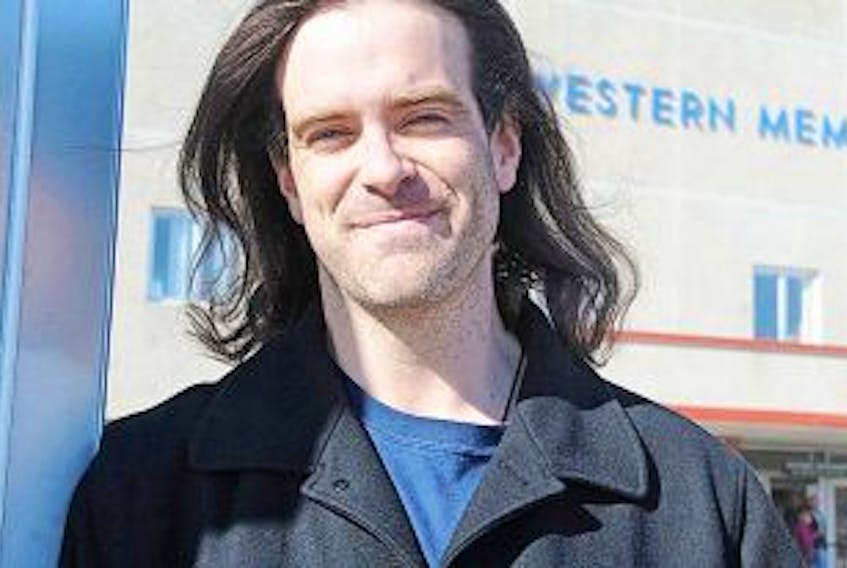
And the battle Andrew Abbass is waging could buoy others whose public expressions of anger and indignation have been countered with unnecessary intimidation or force.
On April 5, 2015, Donald Dunphy was shot dead at Mitchell’s Brook by Sgt. Joe Smyth of the premier’s protective detail, who says he had to defend himself when Dunphy became incensed by questions about his tweets about politicians.
Two days later, when Abbass tweeted angrily about Dunphy’s death, it sparked a visit by police and a week’s involuntary stay at the Corner Brook psychiatric unit under the province’s Mental Health Care and Treatment Act (MHCTA).
When they came for him, Abbass made a last shout-out to the Twittersphere: “They’re here. I’m being detained.”
Four days later, Legal Aid argued in Newfoundland Supreme Court that Abbass was being held unlawfully — that he wasn’t mentally ill and hadn’t been diagnosed as such — and that the court should hear the arguments for his release.
The judge declined, saying Abbass could appeal under the Act.
But in a unanimous decision, three justices of the Newfoundland and Labrador Court of Appeal ruled Abbass’s case should’ve been heard in court.
“Mr. Abbass felt that what the police and physicians did was without proper authority. He sought the vindication of having a Supreme Court judge affirm this.…,” wrote Chief Justice Derek Green, Justice Malcolm Rowe (now with the Supreme Court of Canada) and Justice Charles W. White.
“The courts must always be there for the vindication of the citizen with what he or she views as the wrongful exercise of authority.”
I interviewed Abbass by phone Wednesday in the Corner Brook area, where he was helping a buddy with some painting. He’s happy about the judges’ decision, and sees it as at least partial vindication of his argument that he was held unlawfully for simply tweeting what he felt about a citizen being killed by police.
“It was an emotional response,” said the soft-spoken and highly articulate 36-year-old. “I can’t regret the emotion that was there. I don’t think people should be censored. It’s hard for people to be robots.”
The judges cited a citizen’s right to express objections without fear of unlawful reprisals.
“As the history of authoritarian societies has taught us, confinement in a mental institution is a particularly insidious way of stifling dissent, directly and through intimidation. Was this the intent of the police in this case? Did the physicians simply lend their authority to what the police asked them to do?”
But it’s a bittersweet victory. The fallout from Abbass’s detainment dogs him. His plans as an entrepreneur were derailed. His family was splintered. He wants to find work and be reunited with his young son.
“There’s a stigma associated with that,”Abbass said. “I’ve been walled off by it; it’s hurt my credibility. You’re painted a certain way. … Now I’m trying to put my family life back together. It’s been difficult. … People think someone is mentally ill and it’s a grey area that they fill in with their own worse fears…”
Still, while he’s sorry about how the experience has negatively affected his life, he hopes people who might feel hesitant or fearful about expressing themselves will gain some strength from the court ruling.
“Don’t let them win,” he said. “Don’t be afraid to speak out if you see something wrong. You should be able to freely express your beliefs — without fear.”
That day in 2015, after Abbass was detained at the psych unit, Royal Newfoundland Constabulary Sgt. Tim Buckle texted his friend Joe Smyth — messages that surfaced at the inquiry into Donald Dunphy’s death this year.
Buckle: “Arrested Abbass under MHCTA.”
Smyth: “Saw that! Nice.”
Buckle: “He’s at hospital now.”
Smyth: “Loser.”
Buckle: “Yup.”
Well, Abbass has just scored a win.
The Court of Appeal decision means he will finally get his day in court to argue that his detainment was unlawful.
Pam Frampton is The Telegram’s associate managing editor. Email [email protected]. Twitter: pam_frampton









